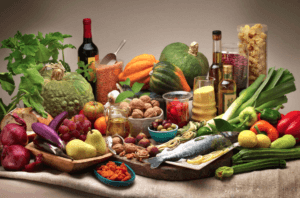
Ports of the Danube cluster on August 1-15, 2023 shipped 1.75 million tons of agro-products, said the head of the Odessa Regional Military Administration Oleg Kiper.
“Ports of the Danube cluster for the first 15 days of August this year shipped 1 million 750 thousand tons of agro-products, and in July – more than 2 million tons,” he wrote in his Telegram channel.
According to his information, in the regional breakdown, Odessa region took the 4th place with a share in the total volume of exports of goods in 5.6%.
“In the commodity structure of exports the largest volume was: cereal crops (52.8%), fats and oils of animal or vegetable origin (15.6%), finished food products (5.1%),” – specified Kiper.
It is noted that in January-June 2023 the enterprises of Odessa region carried out trade operations with partners from 166 countries of the world. Export of goods in monetary terms exceeded $1 bln.

Ukraine’s agrarian sector exports in July 2023 decreased by 29% year-on-year to 3.7 million tons due to the inability of transport to cross the border due to queues, the Ukrainian Club of Agrarian Business (UCAB) reported.
“The disappointing export results are primarily due to the stoppage of the “grain corridor” on July 18, as well as its low activity even before the termination. In July 2023, only 292 thousand tons (of agro-products – IF-U) were exported through this channel. Also, Russia’s shelling of the infrastructure of the Danube river ports had a negative impact on export volumes,” the report says.
In the structure of agricultural exports in July compared to June, UCAB analysts noted a 40% reduction in the export of grain crops (2.3 million tons), where corn accounted for 51% of supplies, wheat – 36%, barley – 13%.
A 12% drop in the index was also shown by cakes extracted in the production of vegetable oils: 320.7 thousand tons of them were exported in July. The share of sunflower cake accounted for 91%, soybean cake – 9%.
At the same time, analysts noted a 37% increase in exports of oilseeds – up to 330 thousand tons. Rapeseed accounted for 73%, soybeans – 23%, sunflower seeds – 3%.
According to UCAB data, the export of vegetable oils also showed positive dynamics – 549.4 thousand tons, which is 7% higher than in June. The share of sunflower oil amounted to 92%, rapeseed and soybean oil – 4% each.
“The biggest drop in export volumes was demonstrated by the positions having significant weight at their relatively low value. They were mainly exported within the framework of the Black Sea Grain Initiative. These are grain crops and oilcakes,” the business association emphasized.
Analysts explained the growth of oilseeds export volume by the beginning of harvest and the start of its export from the country.
“The lack of export opportunities through seaports, the destruction of the infrastructure of seaports of the Odessa region and river ports of the Danube, the risk of a continued ban on imports of a number of Ukrainian agro-industrial products in neighboring EU countries will have a very negative impact on our future exports. We will be able to export products not when the world needs them, but when we have the opportunity to do so, and with significantly higher logistics costs,” the UCAB summarized, while emphasizing that resumption of free navigation is necessary both for Ukraine and the world.

Polish Prime Minister Mateusz Morawiecki assured on Wednesday that Warsaw does not intend to open borders for agricultural products from Ukraine. “We are protecting our agriculture, so we are not opening the borders for agricultural goods from Ukraine,” Polish Radio quoted him as saying Wednesday.
“The war in Ukraine is having an increasingly serious impact on the agricultural market, and this has a negative impact on Poles, so we have imposed an embargo on goods from Ukraine,” Morawiecki said.
He admitted that “in a couple of months, the EU intends to reopen the borders for grain imports from Ukraine.”
“We do not agree to this, we will not open the borders and we will not allow destabilization of our economy. We are obliged to protect Polish interests and our agriculture,” the Polish Prime Minister emphasized.
Polish Agriculture Minister Robert Telusz said that the meeting of agricultural ministers reached an agreement and signed a petition to extend the ban on imports of four grains from Ukraine until the end of 2023.
“The restriction of grain imports from Ukraine has not affected transit. In February, corn transit amounted to 114,000 tons and in June 260,000 tons. Therefore, the European Commission’s decision to open the borders on September 15 is not meaningfully justified,” the Polish Agriculture Ministry quoted Telusz as saying on Twitter.
According to the Polish minister, the ministers of Ukraine and Moldova were invited to the meeting of agricultural ministers in Warsaw, but they could not come for objective reasons. The Polish minister expressed hope for a meeting in the future.
“We want to help Ukraine in transit. We know that this war is a war that we have to win,” Telusz said and added that it will be won when solutions will be “implemented that will help us in this.”
Poland, Hungary, Slovakia, Bulgaria and Romania, in agreement with the European Commission (EC), have banned imports of wheat, corn, rapeseed and sunflower seeds from Ukraine since May 2.
Problems for agricultural producers from a number of European countries associated with the surplus of Ukrainian grain and other agricultural products in the markets of Eastern Europe began in the first months of 2023. In many respects, they were provoked by the temporary abolition of customs duties on imports of grain and oilseeds from Ukraine by the EU. Due to this measure by Brussels, imports of agricultural products from Ukraine to the border states increased significantly.
Ukrainian products, in particular, grain, sunflower, eggs, poultry meat, sugar, apples and apple juice, berries, flour, honey and pasta in unprecedented quantities began to settle on the shelves in these countries, which led to a sharp drop in prices and hit hard the farmers in these countries.
Meanwhile, as First Deputy Prime Minister and Minister of Economy and Trade Yulia Sviridenko said on Wednesday at a meeting with the European Business Association (EBA), Ukraine is categorically against the extension of the EU’s discriminatory ban on the supply of a number of agro-commodities to Poland, Hungary, Slovakia, Bulgaria and Romania after September 15.
According to her, the ban on exports of wheat, barley, rapeseed and sunflower seeds to the above five countries is “discriminatory on the part of the nearest neighbors, especially when Ukraine has an enemy at sea.”
Asked what would happen if the ban was still extended, the first deputy prime minister said that in such a case Ukraine would be forced to consider mirror measures.
“I would not like to say out loud and believe that this is a realistic step, but we think that some mirror measures can be applied,” Sviridenko said.

Ukrainian Danube Shipping Company (UDP) has announced tenders for the transportation of agricultural products by barge from Ukrainian ports on the Danube River to the Romanian port of Constanta, Acting Director General of UDP Dmitry Moskalenko said in Facebook.
“A rush of demand for the transportation of agricultural products from Ukrainian Danube ports to Constanta is coming back. After all, this is the most stable logistical direction,” he wrote.
According to the UPD head, some private shipowners have begun to raise the rates of river freight. Therefore, the department, given the high number of applications from customers, put the transportation services at a tender.
The first tender is planned for June 29. Applications for participation will be accepted till June 28. The starting price is 1 million 497 thousand 690 UAH.
“UDP has always been a supporter of predictable, but market and transparent mechanism for forming tariffs,” – summarized Moskalenko.

The devaluation of the Turkish lira in the near future will not lead to sharp price fluctuations in export and import transactions between Ukraine and Turkey, but there are fears of a decrease in the revenues of Ukrainian exporters that supply goods to the Turkish market, the Ukrsadprom association has reported. “The main export goods for each country are largely tied to a stable foreign currency and depend more on the situation on the global market rather than on changes in the domestic market. Therefore, in the short term, at least until the end of this year, it’s not worth expecting sharp price fluctuations in export and import operations with Turkey,” the association’s press service told Interfax-Ukraine.
At the same time, according to Ukrsadprom experts, there are some concerns about the possible transition of Turkey in payments on foreign economic transactions with its main partners, including Ukraine, from the U.S. dollar to the national currency.
“We are currently considering the possibility of Turkey’s transition to settlements in foreign economic transactions with its main partners … This could cause inconvenience both in the settlement mechanism itself, and in setting prices and the appropriate exchange rate, because, according to most expectations, the Turkish lira will continue depreciating. As a consequence, there is a possibility of lower revenues for Ukrainian exporters,” Ukrsadprom indicates. However, in addition, there are grounds for a certain reduction in import prices for Ukraine when making purchases in Turkey, the association noted.
Ukrsadprom said Turkey is one of the largest importers of domestic agro-food products. For the first six months of this year, Ukraine exported agricultural products to Turkey for $458 million.